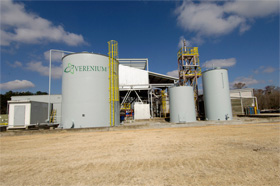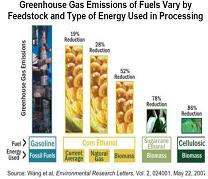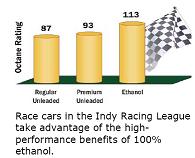 While finding oil in the hot, dry regions of Texas might not be something new, how one company is going about it certainly is.
While finding oil in the hot, dry regions of Texas might not be something new, how one company is going about it certainly is.
Last September, I told you about Valcent Product’s algae-growing operation that has the potential of producing 100,000 gallons of algae oil a year for every acre. That compares to corn’s 30 gallons per acre from corn and soybean’s 50 gallons per acre. Now, the company has attracted the attention of the national media in this CNN story:
“Algae is the ultimate in renewable energy,” Glen Kertz, president and CEO of Valcent Products, told CNN while conducting a tour of his algae greenhouse on the outskirts of El Paso.
Kertz, a plant physiologist and entrepreneur, holds about 20 patents. And he is psyched about the potential algae holds, both as an energy source and as a way to deal with global warming.
“We are a giant solar collecting system. We get the bulk of our energy from the sunshine,” said Kertz.
Algae are among the fastest growing plants in the world, and about 50 percent of their weight is oil. That lipid oil can be used to make biodiesel for cars, trucks, and airplanes.
Most people know algae as “pond scum.” And until recently, most energy research and development projects used ponds to grow it.
 But instead of ponds, Valcent uses a closed, vertical system, growing the algae in long rows of moving plastic bags. The patented system is called Vertigro, a joint venture with Canadian alternative energy company Global Green Solutions. The companies have invested about $5 million in the Texas facility.
But instead of ponds, Valcent uses a closed, vertical system, growing the algae in long rows of moving plastic bags. The patented system is called Vertigro, a joint venture with Canadian alternative energy company Global Green Solutions. The companies have invested about $5 million in the Texas facility.
“A pond has a limited amount of surface area for solar absorption,” said Kertz.
“By going vertical, you can get a lot more surface area to expose cells to the sunlight. It keeps the algae hanging in the sunlight just long enough to pick up the solar energy they need to produce, to go through photosynthesis,” he said.
The article goes on to point out that the idea is not new, as the U.S. Department of Energy experimented with algae oil for about 20 years from the late 1970s to the mid 1990s. But the price of a barrel of oil in the mid-90s was only about $20. Now, with prices over $100 a barrel, experts think the process could now be profitable.
Valcent has a pretty cool video of the process on its web site: www.Valcent.net. Check it out!
 Sales of alternative fuel vehicles in the United States, including flex-fuel and hybrid electric, reached 1.8 million last year, about 250,000 more than in 2006.
Sales of alternative fuel vehicles in the United States, including flex-fuel and hybrid electric, reached 1.8 million last year, about 250,000 more than in 2006.


 According to officials, the site has been electronically energized and the turnover of individual systems to start-up and operating teams has begun so that the functional capabilities of each system can be tested. In total, more than forty separate systems will be evaluated over approximately the next three months.
According to officials, the site has been electronically energized and the turnover of individual systems to start-up and operating teams has begun so that the functional capabilities of each system can be tested. In total, more than forty separate systems will be evaluated over approximately the next three months. Spirits were high for driver Ryan Hunter-Reay at the start of the race where he had qualified for sixth pole position. After ten laps behind the pace car in the rain, the field opened up and Hunter-Reay spun out, dropping him down to 23rd.
Spirits were high for driver Ryan Hunter-Reay at the start of the race where he had qualified for sixth pole position. After ten laps behind the pace car in the rain, the field opened up and Hunter-Reay spun out, dropping him down to 23rd.  Drivers Oliver Gavin and Olivier Beretta won their second consecutive class victory on the waterfront street circuit in St. Petersburg, Florida.
Drivers Oliver Gavin and Olivier Beretta won their second consecutive class victory on the waterfront street circuit in St. Petersburg, Florida. 
 That company is
That company is  While finding oil in the hot, dry regions of Texas might not be something new, how one company is going about it certainly is.
While finding oil in the hot, dry regions of Texas might not be something new, how one company is going about it certainly is. But instead of ponds, Valcent uses a closed, vertical system, growing the algae in long rows of moving plastic bags. The patented system is called Vertigro, a joint venture with Canadian alternative energy company Global Green Solutions. The companies have invested about $5 million in the Texas facility.
But instead of ponds, Valcent uses a closed, vertical system, growing the algae in long rows of moving plastic bags. The patented system is called Vertigro, a joint venture with Canadian alternative energy company Global Green Solutions. The companies have invested about $5 million in the Texas facility. International engineering firm Harris Group, which has a stake in the alternative energy game, has named former Imperium Renewables Vice President Mark Warner as the company’s director of the program management services.
International engineering firm Harris Group, which has a stake in the alternative energy game, has named former Imperium Renewables Vice President Mark Warner as the company’s director of the program management services. A new paper from the U.S. Department of Energy tries to put to rest some of the myths that still swirl around biofuels.
A new paper from the U.S. Department of Energy tries to put to rest some of the myths that still swirl around biofuels. MYTH: In terms of emissions, biofuels emit the same amount as gasoline or more.
MYTH: In terms of emissions, biofuels emit the same amount as gasoline or more. MYTH: Ethanol gasoline blends can lower fuel economy and may harm your engine.
MYTH: Ethanol gasoline blends can lower fuel economy and may harm your engine.